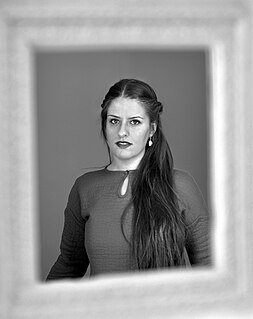2010
The jury of Sheed award 2010, including Ed Kashi, Kamran Jebreyili, Kaveh Kazemi, Jahangir Razmi and Peyman Hooshmandzadeh, nominated seven men among more than 230 photographers to receive the award.
Ed Kashi is an American photojournalist and member of VII Photo based in the Greater New York area. Kashi's work spans from print photojournalism to experimental film. He is most noted for documenting sociopolitical issues.
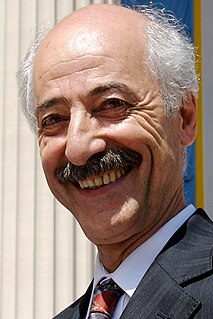
Jahangir Razmi is an award-winning Iranian photographer and the author of the entry that won the 1980 Pulitzer Prize for Spot News Photography. His photograph, Firing Squad in Iran, was taken on August 27, 1979 and published anonymously in the Iranian daily Ettela'at, the oldest still running newspaper in Iran. Days later, it appeared on the front pages of numerous newspapers around the world. The photograph was the only anonymous winner of a Pulitzer Prize in the 90-year history of the award, as the identity of Razmi as the photographer was not revealed until 2006.
Peyman Hooshmandzadeh is an Iranian photographer and author.
The nominated photographers were as follows: Majid Saeedi, Hossein Fatemi (photographer), Abotaleb Nadri, Behrouz Mehri, Hamed Khorshidi, Ali Hamed Haghdoost and Mohammad Reza Soltani and finally Behrouz Mehri from Agence France-Presse (AFP) got the award.
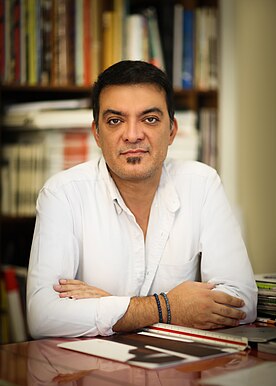
Majid Saeedi is an Iranian documentary photographer. He started photography at the age of sixteen and has photographed humanitarian issues in the Middle East for the past two decades. Majid Saeedi has been published in international publications and won numerous awards for his photography.
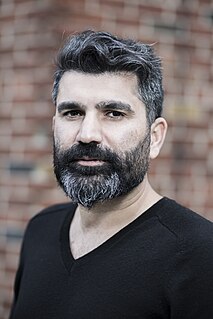
Hossein Fatemi is an Iranian photojournalist. He received the 2nd place World Press Photo Award in 2017, and the Picture of the Year International (POYi) in 2016 and 2014 in two categories. He is member of Panos Pictures since 2010.

Agence France-Presse (AFP) is an international news agency headquartered in Paris, France. Founded in 1835 as Agence Havas, it is the world's oldest news agency, and is the third largest news agency in the modern world after the Associated Press (AP) and Reuters.

Zahra "Ziba" Kazemi-Ahmadabadi was an Iranian-Canadian freelance photographer, who according to the medical examiner was raped, tortured and killed by Iranian officials following her arrest in Iran.

Mohammad-Reza Shajarian is an internationally and critically acclaimed Iranian classical singer, composer and Ostad (master) of Persian traditional music. He has been called "Iran's greatest living maestro of Persian classical music." Shajarian is also known for his skills in Persian calligraphy, and humanitarian activities.
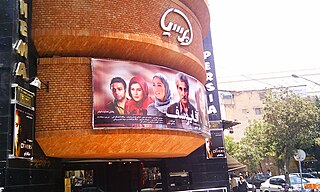
The Cinema of Iran, also known as the Cinema of Persia, refers to the cinema and film industries in Iran which produce a variety of commercial films annually. Iranian art films have garnered international fame and now enjoy a global following.

Behesht-e Zahra, is the largest cemetery in Iran. Located in the southern part of metropolitan Tehran, it is connected to the city by Tehran Metro Line 1.
Iranian Canadians or Persian Canadians are citizens of Canada whose national background is traced from Iran or are people possessing Iranian and Canadian dual citizenship. From the 2016 Canadian census, the main communities can be found in Southern Ontario, British Columbia, and Quebec. The vast majority, however, live in the northern suburbs of Toronto such as Richmond Hill, Vaughan, Markham, and Thornhill, and in the municipalities of Vancouver such as: North Vancouver, West Vancouver, Burnaby, and Coquitlam. As of 2016 a total of 97,110 Iranians reside in the Greater Toronto Area, 46,255 in the Greater Vancouver Area, 23,410 in the Greater Montreal Area, and the remainder are spread out in the other major cities in Canada based on the 2016 Canadian Census. These numbers represent the people who stated "Iranian" as their ethnic origin in the census survey.

Prince Abdol-Hossein Farman Farma was one of the most prominent Qajar princes, and one of the most influential politicians of his time in Persia. He was born in Tehran to Prince Nosrat Dowleh Firouz in 1857, and died in November 1939 at the age of 82. He was the 16th grandson of the Qajar crown prince Abbas Mirza. He fathered 26 sons and 13 daughters by 8 wives. He lived to see four sons of his first wife die within his lifetime.

Prince Abbas Mirza Farman Farmaian Qajar (1890–1935) Iranian royal prince of the Persian Imperial Qajar Dynasty, was the second son of Prince Abdol-Hossein Mirza Farmanfarma of Persia, one of the most preeminent political figures of his time and of the royal Princess Ezzat ed-Dowleh Qajar, the daughter of king Mozaffar-al-Din Shah. He was named after his great-grand father, crown prince Abbas Mirza son of Fath Ali Shah Qajar.
Intellectual movements in Iran involve the Iranian experience of modernity and its associated art, science, literature, poetry, and political structures that have been changing since the 19th century.
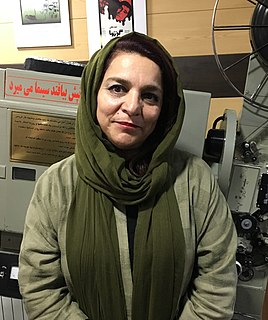
Tahmineh Milāni is a professional film director, screenwriter, and producer who came to the limelight by breaking all the traditional and conventional norms about women and their presence in Iran's society. Being sentenced to prison have not stopped her from expressing their feminist ideas freely and finally her style has become a canon against which other feminist works would be evaluated. Milani was born 1960 in Tabriz, Iran. She is the wife of the Iranian actor and producer Mohammad Nikbin.

Merilā Zāre'í is an Iranian actress.

Ellen Kuras is an American cinematographer whose body of work includes narrative and documentary films, music videos and commercials in both the studio and independent worlds. One of few female members of the American Society of Cinematographers, she is a pioneer best known for her work in Eternal Sunshine of the Spotless Mind (2004). She has collaborated with directors such as Michel Gondry, Spike Lee, Sam Mendes, Jim Jarmusch, Rebecca Miller, Martin Scorsese and more. She is the three-time winner of the Award for Excellence in Dramatic Cinematography at the Sundance Film Festival, for her films Personal Velocity: Three Portraits, Angela and Swoon, which was her first dramatic feature after getting her start in political documentaries.

The Cabinet of Iran is a formal body composed of government officials, ministers, chosen and led by a President. Its composition must be approved by a vote in the Parliament. According to the Constitution of the Islamic Republic of Iran, the President may dismiss members of the cabinet, but must do so in writing, and new appointees must again be approved by the Parliament. The cabinet meets weekly on Saturdays in Tehran. There may be additional meetings if circumstances require it. The president chairs the meetings.
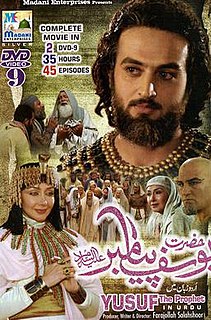
Prophet Joseph is a 2008 Iranian television TV series directed by Farajollah Salahshoor, which tells the story of Prophet Joseph from the Quran and Islamic traditions. It is also set in the historical context of the Amarna period of ancient Egypt.

Love-stricken is a 1992 Iranian historical drama film directed by Ali Hatami. The movie is mainly about some Iranian classical musicians in Ghajar era and their struggle to release their first Record which takes them on a journey to France. The film uses many notable Iranian actors and actresses. Among them are: Amin Tarokh, Akbar Abdi, Saeed Poursamimi, Mohamad Ali Keshavarz, Jamshid Hashempour, Hamid Jebelli, Fathali Oveisi, Shahla Riahi, Leili Rashidi, Leila Hatami,and Anna Borkowska.

Soore University (SU) is a private research university located in Tehran, Iran. Founded in 1994, it is often ranked as one of the Iran's most prestigious universities. SU is commonly known as the "Iranian CalArts."
Alireza Kazemipour is an Iranian screenwriter. He started his career in 1999 and followed it mainly by writing scripts for TV series. His screenplays have been nominated or winner in different national and local festivals.







